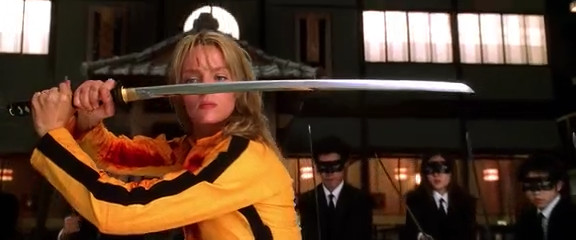Monday, August 16, 2021
Kill Bill: Vol. 1 (2003)
This film really stands out. It’s not pure action, it’s not a character study, it’s not beholden to a specific genre. I can be entertained by a number of things, but to be this entertained takes something beyond typical well-received cinema.
I can enjoy this film despite it having no personal significance to me. My appreciation of it does not depend on external circumstances. This is a mainstream popcorn flick, and it’s also culturally significant and a work of art. Peak Tarantino content.

Uma Thurman wields a powerful sword. Six years after co-starring in an embarrassingly bad Batman movie, she’s still pissed.
Comparisons can be drawn between Kill Bill and other martial arts cinema like the Bruce Lee stuff, the John Woo stuff, Oldboy, etc. It stylizes images of mostly-regular people to form a kind of superhero mythos brought down to Earth. This is the inverse of the stylistic choices made by actual superhero outfits like Marvel. If you appreciate cinema, the difference between a Kill Bill and an Avengers needs no explanation, but I’ll explain it anyways.
Tarantino does not pretend to make high art, but he’s better at it than some people. Marvel’s superhero movies are designed to appeal to young children. I recall seeing Kill Bill advertisements as a middle schooler, mainly as promos for Sony’s state-of-the-art PlayStation Portable and the UMD video format. I was curious. I would have adored Kill Bill as a 12-year-old, and I don’t give a fuck that it’s rated R. I ended up watching it around ten years later, and I missed out on the pop culture phenomenon that surrounded it at the end of the Attitude Era in the Bush years.
If you have young children, make them watch Kill Bill. It’s violent, emotional, comedic, and totally aware of what it is. You might have to explain what the Vaseline is for, but that’s because the film implies more than it shows in the sex and shows more than it tells in the violence. It’s over-the-top and there is no reason not to watch it. To see a film so fresh when it came out would have been like, maybe, seeing Django Unchained (2012) or another good Tarantino film when it came out.
I can’t get enough of the early 2000s and the optimism there. Society has taken a turn for the worse, but it’s not Quentin’s fault. If anything, he fought to preserve the best parts of culture, and they’re still there, in celluloid and digital images as hollow phantoms of a time when nothing was out of reach.